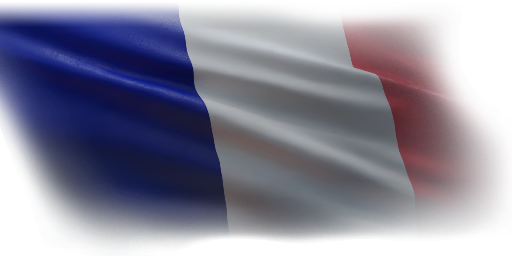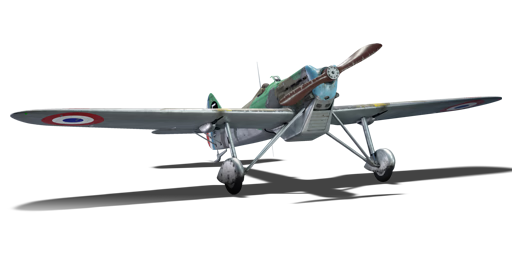

Aviation
D.501
I
Rank
AB
1.7
RB
1.3
SB
1.3
Battle rating
France
Research country
Fighter
Main role
1,500

Research
700

Purchase
General information
The D.501 was a subvariant of the D.500 series of aircraft developed by the French Air Ministry in the early 1930s. The D.501 used a different powerplant and armament compared to the D.500. Instead of the regular Hispano-Suiza 12Xbrs engine, it used the 12Xcrs, which allowed mounting a more powerful armament in the form of a 20 mm cannon as well as a couple of machine guns. For the time of its introduction, autocannons were very rare in regular fighters, since most used a pair of light machine guns. As such, the armament could be considered one of the best for its time. A total of 160 D.501s were produced by the time of World War II, with very limited service on the front line.
IThe D.501 was introduced in Update 1.73 "Vive la France".
Camouflages
Flight performance
Max speed
at 5,000 m
363347372354 km/h
Rate of Climb
12.510.514.710.5 m/s
Turn time
1314.312.413.6 s
Max altitude
9,000 m
Takeoff Run
150 m
Landing
flaps
flaps
Take-off
flaps
flaps
Combat
flaps
flaps
Air
brake
brake
Gear
control
control
General characteristics
Crew
1 person
Engine
Length
7.7 m
Wingspan
12.1 m
Wing Loading
107 kg/m²
Weight:
Base weight
1.551.61.511.59 t
Fuel in main tanks
0.21 t (1h 13m)
Limits:
Max Speed Limit (IAS)
576 km/h
Mach Number Limit
0.67 M
G limit
≈ -8/13 G
Offensive armament
20 mm Hispano 404 cannon
Ammunition
60 rounds
Fire rate
700 shots/min
One-second Burst Mass
1.45 kg
| Belt | Belt filling | Armor penetration (mm) at a distance: | |||||
|---|---|---|---|---|---|---|---|
| 10 m | 100 m | 500 m | 1000 m | 1500 m | 2000 m | ||
| PT/HEI/AP/HEI-T | 38 | 34 | 23 | 14 | 9 | 5 | |
| AP-T/HEI/AP-T/HEI | 38 | 34 | 23 | 14 | 9 | 5 | |
| AP-T/AP/AP-T/HEI/AP-T | 38 | 34 | 23 | 14 | 9 | 5 | |
| AP-T/HEI-T | 38 | 34 | 23 | 14 | 9 | 5 | |
| AP/HEI | 38 | 34 | 23 | 14 | 9 | 5 | |
2 × 7.5 mm MAC 1934 machine gun
Ammunition
600 rounds
Fire rate
1,350 shots/min
One-second Burst Mass
0.22 kg
| Belt | Belt filling | Armor penetration (mm) at a distance: | |||||
|---|---|---|---|---|---|---|---|
| 10 m | 100 m | 500 m | 1000 m | 1500 m | 2000 m | ||
| T/Ball/Ball/Ball/I/AP | 13 | 12 | 7 | 3 | 2 | 0 | |
| T/AP/AP/I/I | 13 | 12 | 7 | 3 | 2 | 0 | |
| IT | 3 | 3 | 3 | 3 | 0 | 0 | |
| AP/AP/I | 13 | 12 | 7 | 3 | 2 | 0 | |
Economy
Repair cost
Basic → Reference
AB
113 → 151 

RB
150 → 200 

SB
106 → 142 

Crew training
200 

Experts
1,000 

Aces
20 

Research Aces
96,000 

Reward multiplier
AB / RB / SB
10 / 20 / 60 % 

100 % 

Total cost of modifications
2,970 

885 

Talisman cost
190 

Research order:
Flight performance | |
|---|---|
Survivability |
|---|
Weaponry |
|---|
Rating by players
You must play more than 3 battles for the last week and more than 10 battles in a vehicle to rate it.
Like:
14
Flight performance:
Not enough ratings
Survivability:
Not enough ratings
Aerial combat:
Not enough ratings
Ground attack:
Not enough ratings
Balance:
Not enough ratings
Tips & Tricks
This space is currently empty
Do you know any interesting vehicle features?
Loading...
No articles about this vehicle yet
Become the first author and get rewards!
Write a guide, tell about interesting historical facts, make a tutorial or simply an interesting post.
No more content